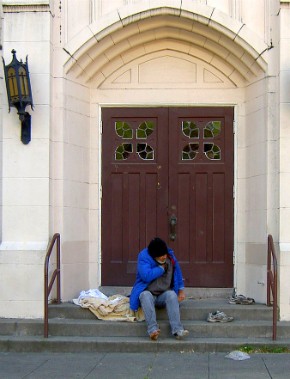The poor door: Class separation in the church
The sky-high cost of housing here in Manhattan just hit a new low. Extell, one of the city’s largest developers, has been accepted for the Inclusionary Housing Program. This means that the company is allowed to construct larger buildings with generous subsidies and tax breaks as long as its plans include a certain percentage of low-income apartments. Apparently the only way to get developers to do what they should do is by appealing to their bottomless self-interest. As if to underscore that there is no good will involved, Extell’s application has a provision that the people residing in the more affordable apartments would have their own entryway—in a back alley behind the building.
According to a company spokesman, “No one ever said that the goal was full integration of these populations.” Well, someone might have said that—like Isaiah or Jesus—but what did they know about 21st-century New York City real estate? “I think it’s unfair to expect very high-income homeowners who paid a fortune to live in their building to have to be in the same boat as low-income renters, who are very fortunate to live in a new building in a great neighborhood.” But how great is a neighborhood when some residents wish that others were invisible?
Predictably, news of the poor door has ignited flames of outrage. But they’ll die down. The poor doors in luxury buildings are just the latest manifestation of what goes on every day. Our systems of health care, education, immigration, and criminal justice all have their poor doors in the back alleys of edifices built for the more privileged.





